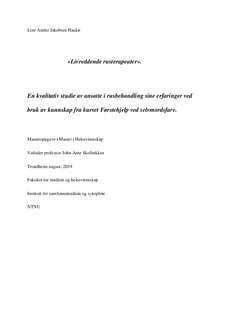| dc.contributor.advisor | Skolbekken, John - Arne | |
| dc.contributor.author | Jakobsen Haukø, Line Anette | |
| dc.date.accessioned | 2019-12-02T15:00:27Z | |
| dc.date.available | 2019-12-02T15:00:27Z | |
| dc.date.issued | 2019 | |
| dc.identifier.uri | http://hdl.handle.net/11250/2631316 | |
| dc.description.abstract | Sammendrag
Bakgrunnen for denne studien:
Selvmord utgjør et betydelig folkehelseproblem både i verden og i Norge. På grunn av ringeffektene selvmord kan ha, bør mange mennesker ha kunnskap om å avverge selvmord.
Rusavhengige ansees som en risikogruppe for selvmord, og alle sykehuspasienter med denne problematikken kartlegges om erfaring med selvmord. Det er derfor relevant at rusterapeuter har kunnskap om selvmordsforebygging.
Kurset Førstehjelp ved selvmordsfare er et av Helsedirektoratets selvmordsforebyggende tiltak. Kurset er et manualbasert undervisningsprogram som går over 2 dager. Det er utviklet av organisasjonen Living Works i Canada, og går under navnet ASIST.
Problemstilling: Studien undersøker hvordan rusterapeuter bruker kunnskap fra kurset førstehjelp ved selvmordsfare i praksis.
«Hvilke erfaringer har deltakerne gjort seg i praksis med mennesker som har rusproblem?»
Metode: Det ble benyttet kvalitativ metode hvor det ble gjennomført tre fokusgrupper og ett enkelt dybdeintervju. Studien inkluderer 14 informanter. Data ble analysert ved hjelp av Malteruds (2017) systematiske tekstkondensering.
Resultat: Studien viser at kurset var sterkt, engasjerende og lærerikt fordi deltakerne måtte bli kjent med profesjonell og privat kunnskap. Kurset gjorde deltakerne mer bevisste når de undersøkte selvmord og de beskrev større kunnskap i å kunne støtte den selvmordsnære videre. Kurset har bidratt til en felles forståelse av problematikken blant pasienter og blant sine venner og kollegaer.
Konklusjon: Informantene finner kurset nyttig. Det fungerer som et godt supplement til nasjonale retningslinjer om selvmordskartlegging. Opplæring innenfor selvmordsforebygging i utdanningene er mangelfull. Informantene anvender kunnskapen på andre livsarenaer, og med dette øker rekkevidden av kunnskapen. På bakgrunn av dette anbefales videre forskning på virkningene av utført førstehjelp.
Nøkkelord: Rus + selvmordsforebygging + Førstehjelp ved selvmordsfare | |
| dc.description.abstract | Abstract
Background:
Suicide is a major public health problem worldwide, and in Norway. The human losses have impact on relatives, friends and the community in general; there is good reason to argue that more focus should be set on the importance of how to avert suicide.
Alcohol and drug addicts are considered being at risk for suicide. For this reason, all hospital patients with addiction related diagnoses in Norway are screened on topics like suicide attempts and thoughts. Further, it is particularly important that addiction therapists have the necessary competence to save lives.
Applied Suicide Intervention Skills training is one of several interventions on suicide prevention conducted by the Norwegian Directorate of Health. ASIST is a two-day manual-based workshop. It is developed by the Living Works organization in Canada and is known as ASIST.
Thesis statement:
The present master thesis aims at clarifying how addiction therapists use their knowledge from the ASIST workshop.
“What experiences have participants made in their practice with addicts, using skills form ASIST?”
Method:
A qualitative method was used in which three focus group interviews and one single in-depth interview were conducted. The study includes 14 informants. Data was analyzed using Malterud’s (2017) systematic text condensation
Results:
The study shows that the workshop was experienced as very engaging and meaningful especially because the participants had to use their professional and own life experiences on the topic. The workshop contributed to more awareness about focusing on people at risk and the participants described increased skills in being able to support people at risk. The participants also experienced that the course had contributed to a common understanding of the problems among patients and among their friends and colleagues at work.
Conclusion:
The participants view ASIST as very useful and it has served as a good supplement to national guidelines on examine suicide. Suicide awareness and preventions plays an inadequate part of curriculums throughout the general educational system in Norway The participants have used the knowledge they have learned also on other arenas of their life, and with this they have increased the range of their knowledge on the subject..
For this reason, it is recommended to look into the effects of interventions of suicide prevention in the future.
Keywords: Suicideprevention + addiction + ASIST. | |
| dc.language | nob | |
| dc.publisher | NTNU | |
| dc.title | Livreddende rusterapeuter | |
| dc.type | Master thesis | |
